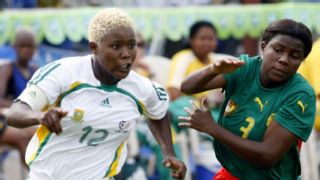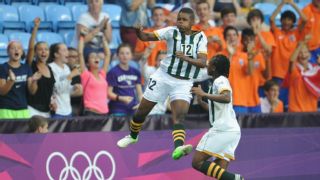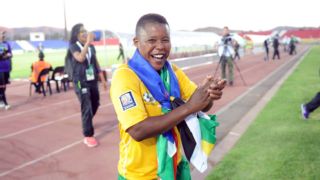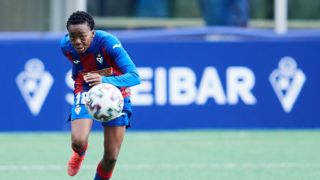Former South Africa striker Portia Modise doesn't care if the football community loves her. She doesn't care if you like her outspoken manner, or the way she dresses, or that she loves women.
She's the only African footballer, of any gender, to score 100 international goals, and represented her country for 15 years from the age of 16. But if you don't want to give her respect for that, or her countless achievements on the field, she's not too fussed about that either.
One of the first openly gay players in the global game, Modise says she only cares about furthering women's football in South Africa, protecting female players from harassment, and being a voice for the LGBTQ+ community in her country.
Modise, who retired in 2015 after 124 international appearances, including scoring a stunner at the 2012 London Olympics, told ESPN: "I played my part.
"If people didn't love me when I was scoring goals, putting South Africa on the map, why would I expect them to love me because I tell the truth about women's football?
"By the time I retired, I knew that they [the football community] will always say that I'm a problem child, but I was always trying to figure out how I'm a problem child.
"When I was entering that field, I was the best player -- I was disciplined. I was only a problem child when I was telling the truth about the unfairness that was happening in women's football, [about] the way we were treated.
"Back then, I didn't even think that women's football would be powerful in South Africa, but I made it powerful. I made people recognise that there is women's football."
Her refusal to quietly accept what was handed to her, or to accept the way her fellow players were treated, often overshadowed her football. But the impact of her defiance can be felt in how female, and queer, players are treated today.
'Since I was young, I was always out'
For all her footballing achievements, Modise, now 39, is probably most well known for being openly gay in the early 2000s when few in world sport were. Certainly not in football, and not in African sport as a whole, where being queer is still often career-ending.
Today, 21 years after her debut in 2000, the out footballers in Africa can be counted on one hand, but interestingly include her captaincy successor for Banyana Banyana, Janine van Wyk.
Despite hard-earned legal freedoms and constitutional rights won since apartheid [same-sex marriage has been legal in South Africa since 2006], much of the LGBTQ+ community in South Africa lives in perpetual fear of violence.
Murder and 'corrective rape', during which women are violated to 'fix' their queerness, are still an epidemic for Black women in particular. There have been over 20 recorded LGBTQ+ hate crime murders locally since February 2021.
For Modise, the especially brutal rape and murder of national teammate and fellow queer activist Eudy Simelane in 2008, who was stabbed 25 times, further spurred her on in her fight for fair treatment, and was a factor in her exit from the team for four years.

Modise says that those with her platform have the duty to speak out against such injustices, even in the face of resistance and at the risk of personal or financial backlash.
She told ESPN: "I speak out [about hate crimes] because why do we need to be killed just because we are [queer]?
"I didn't wake up to choose to be gay. I didn't want to be insulted every day when I walk in the street. I didn't choose this, but I was born like this.
"I also blame our government. They give us these rights as LGBTIQ+ people, but they don't really practice them.
"It's always a struggle for us to get proper treatment when you go to hospitals. When you go to the police stations, the way they will treat you is like you are not human. They start to judge your sexuality.
"We still have soccer players that are as gay as me, but they can't come out because they are scared of losing their career, they are scared of being judged, they are scared of people that will see them different, not as human. That is crazy. Where are we practicing these 'human rights'?"
It was never smooth sailing for Modise, even at the start of her career. When she was welcomed into the national team as a quick-dribbling, hard-striking teenager, aged just 16, she had come to terms with her identity as a lesbian and her team was accepting.
But not all within South African football were as open-minded. Indeed, Modise says some pandered to the same anti-gay attitudes that saw her regularly harassed on the streets by strangers.

Modise says that she was told by the football governing body to hide her sexuality: "They [members of the SAFA technical team] used to say we [queer players] need to say we have boyfriends.
"I would ask them: 'Which boyfriends? Why do I need to lie and say I have a boyfriend when I have a girlfriend -- someone who has always supported me in my career? Why do I have to hide that person and create someone that I don't even know?'"
She was never in the closet at all, she added: "There was no day when I would hide my sexuality. For who? I was always vocal, if I was the first one to be kicked out the team because I was gay, then [so be it]. I was not going to back down.
"I didn't choose to be the person that I am. For other people to think I need to hide myself or do a favour for them -- act in a different way to make them happy -- I was not going to do that."
Modise's recollection is corroborated by Fran Hilton-Smith, the former Banyana Banyana coach and team manager, who has known Modise since she was a teen.
"It [took] someone like Portia, who changed the ground rules about it [homosexuality in South African football]," Hilton-Smith told ESPN.
"She bravely -- I want to tell you, very bravely in this culture -- stood up and was counted and said: 'I'm gay. Take it or leave it.'
"I would think it probably would be [true that Modise and her teammates were asked to hide their sexuality]. There was always a prejudice or a stigma that women's football was always about the girls who were gay.
"It was something that wasn't spoken about much and certainly not promoted, because it was seen as something that would deter sponsorship."
During her career, even as a very young player and well before Simelane's murder, Modise was unafraid to take a public stance against injustice.
In 2005, then-SAFA women's committee chairperson Ria Ledwaba said: "We don't want our girls to look, act and dress like men just because they play soccer," as quoted by City Press.
Modise, who was nominated for FIFA's Player of the Year that same season, responded at the time: "There is nothing wrong in being a lesbian; it is how you project yourself in public places. You are born with it and you won't just change it because somebody says you should do it.
"We need sponsors but all the committee does is raise less important issues because they have failed to transform the sport."
A scandal and a four-year hiatus
The most notable public stance Modise took was in 2008, the same year Simelane was murdered, when she accused then-Banyana Banyana coach Augustine Makalakalane of demanding sexual favours from players in exchange for selection -- claims which were later echoed by Gloria Thato and Nthabiseng Matshaba.
Modise also accused Makalakalane of discriminatory treatment towards lesbian players. He was widely reported to have only wanted "straight ladies on the team". As a result, she exited the national team set up and only returned in 2012 for the London Olympics.
When asked about the reasons for her falling out with Makalakalane, she said: "You have male coaches who are really not strong mentally, coaching women. They will always see women in the same way and want to utilise the [team] space to sleep with these girls.
"That will never happen on my watch because we are not there to be utilised. We are there to do what we love, to share the game, to motivate other women out there and to make sure that if they want to play the game, there are people like us fighting for them."
She alleges: "Players that were dropped deserved to be part of the team, but they didn't want to sleep with the coaches -- that's why they were dropped. I really didn't support that and I was hated for that and I'm not apologetic for that. I'm not going to apologise, even now."
Makalakalane was suspended from his role in December 2010. Rather than reach a decisive conclusion on the allegations levelled against him, SAFA opted not to renew his contract.

Although he was never found guilty of sexual misconduct, the issues which Modise raised awareness about led to the promotion of female coaches.
According to Hilton-Smith, who helped form the women's national team, the rationale was that female coaches would be more sensitive to issues faced by other women than men could be.
Hilton-Smith said: "It was rumoured at the time, yes, that there were some issues -- like Portia raised - and that Augustine was not too in favour of the gay girls, but that was never brought to any [legal] conclusion.
"One of the decisions, going forward, was that they wanted to empower more women in coaching, so a huge effort was made to develop more women coaches. That certainly happened -- I was the driving force behind that.
"All our women's national teams are coached by women and we have 27 women who have the CAF A-License, which is the highest qualification in Africa. We decided to try to be proactive in developing women in football. That, certainly, SAFA has done."
As long as there are players, gay or otherwise, who feel unsafe within the game, Modise intends to be present to speak up for their rights. In addition, she remains a vocal advocate for broader reforms within women's football.
These days, Modise is focusing on her foundation that seeks to establish football structures for women and girls at a grassroots level and in schools, and has completed her D and C coaching licenses. She also does a radio show about women's football, Feminine First Touch, on Massiv Metro.
She says: "As much as they [critics] think we don't have women's football's best interests [at heart], we do. That is why we talk so much -- that is why we keep shouting -- because we want to see women's football taking place like [at] the European teams."
A trailblazer for African players overseas
Modise has the pedigree to discuss European women's football, after an ill-fated stint with Arsenal Ladies [as they were known at the time] for four months in 2003, and then playing in Denmark for two years during her national team hiatus.
She was a rare female African player in European in the mid-2000s, before such transfers became standard practice. Her two years at Fortuna Hjorring played a significant role in increasing African women's presence overseas.
In Denmark from 2007 to 2009, Modise experienced a greater sense of acceptance for her sexuality, but says she did not really feel at home.
"I never felt [discriminated against] in Denmark for my sexuality. Instead, I lived my life fully and I enjoyed it. But it's not easy to be a foreigner, especially when you are Black," Modise says.
"When you are Black, it comes with disadvantages, because you need to really prove yourself. 'Why did they decide to go and sign a player in Africa while there are all these better players in Europe?'
"Also, because they don't know Africa, some of them [thought] that you are living in these cave houses and there are a lot of disadvantaged things about you. That you don't even know the microwave or the fridge, [that] you're not exposed to such things.
"But I liked the character that I had because I believed that [stereotyping] wasn't going to stop me in proving those girls wrong. It didn't matter where I came from, I was talented. I just wanted to share my talent with these girls, it didn't matter the colour."
Her impact on African women's football overseas can be seen today, with a large number of stars from the continent plying their trade in Spain, Sweden, China, and dotted around the northern hemisphere.

One such player is South Africa striker and 2018 African Player of the Year Thembi Kgatlana, who currently plays for Eibar in Spain but has also played in the NWSL with the Houston Dash, in Beijing, and Portugal too.
Kgatlana, who is 25, told ESPN on a La Liga Southern Africa/SAFJA press call: "I got to play with Portia [when I was very young], but it was not a long time before she went to play in Denmark with Hjorring.
"She played a very huge role in terms of paving the way for me to be able to distinguish between being a player that plays in South Africa with less opportunities, and growing up to be the player that I am, playing overseas with multiple opportunities.
"In that sense, not only did she play for herself, but she played for younger kids like me who got inspired along the way. I think there's been a lot of movement and progress of getting South African players to Europe [as a result].
"To know that you have at least 60-65% of your regular Banyana players playing overseas can only make you happy. You want to see more and more players going out and it is up to our generation of players to be a good anchor for the players coming [up] in South Africa."
A case of life imitating art
Raised by a single, disabled mother in Soweto, and never knowing her father, for Modise, being loved in her personal life seems to have been as complex as her professional one, and they appear to echo each other.
Single as of recently, Modise says: "You know, love is not easy. I always say the way we grow up and the way we were taught love by our parents -- sometimes, we [reflect] that. [Because] I was raised in a broken home, I try to learn love myself by being in a relationship.
"It gets so difficult. You get to realise that the little love you know is not enough for the person that you're with. The more we grow up, the more we realise that our parents f***ed us up. We are really struggling with this love thing."
But like with football, setbacks don't deter her from her goals, and she says having a family, and children, is not something she has given up on and will work to avoid the mistakes her parents made.
She says: "I love kids. I'm very obsessed with kids. When I find a good thing, where I know me and her can be good parents, I will make sure that what we didn't get growing up, we will be able to implement in our son or daughter.
"I'm not thinking about it for now because I don't have a partner, but I think as time goes on, I will be having that."

